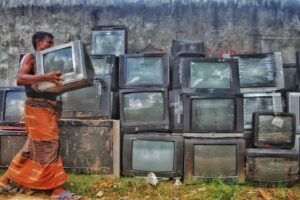INCREASED AIR POLLUTION DUE TO E WASTE
READ THIS BELOW ARTICLE FROM A COMPANY IN MARYLAND. THIS SHOWS WHY PROPER DISPOSAL OF E WASTE IS MUST.
“The onset of the 21st century has started a corresponding change in consumer lifestyles, resulting in the generation of a huge amount of the end-of-life electronics, known as e-waste. The e-waste recycling activities can pose a high risk to the environment and human health. We monitored air pollution levels (PM10) and heavy metal concentrations (Pb, Cu, Zn, Ni and Cr) in the air for three consecutive months in an area where illegal DISPOSAL OF E WASTE was in operation and compared the results with other two residential sites. In addition, we measured the concentrations of the same heavy metals in human blood to find out if there exists any correlation between environmental and biological exposure. Hypoxemia and hypertension were also determined for the comparison of health status amongst the study population. The study design comprised of three sites, which were selected on the basis of different major activities in the respective areas. Air samples were collected with the help of RDS and subjected to heavy metals analysis by ICP-OES, whereas blood samples were analyzed by ICP-MS. Results showed that amongst all study sites significant highest mean concentration of PM10 (243.310 ± 22.729 μg/m3) and its heavy metal was found at e-waste burning site (SIII). High levels of heavy metal in the air were responsible for the higher exposure to the residents of SIII. Therefore, the study concluded that e-waste burning by the informal sector has significantly contributed to the high levels of the air pollution, which in turn was responsible for the highest level of heavy metal exposure to the residents. This was also associated with the occurrence of cardiovascular morbidity namely hypertension amongst the inhabitants of SIII may indicate the effect of chronic exposure to the air pollution due to e-waste processing activities, which needs to be studied further.”

DISPOSAL OF E WASTE
Electronic waste, also called e-waste, is the name for electronic devices that have come towards the end of their useful life, are outdated, or have been replaced. The most common devices include computers, monitors, televisions, stereos, copiers, printers, fax machines, cellphones, DVD players, cameras, batteries, and many more electronic devices. These used electronics can be reused, resold, salvaged, or recycled. However, more often than not, your old electronics either sit in a drawer collecting dust or gets tossed out with last months uneaten leftovers. The problem with throwing these devices out is that they are overflowing our landfills and this could be very dangerous. Most electronics are made with toxic chemicals and metals that are perfectly safe when in use, but that’s not the case when they are being tossed away; they can pose serious health risks if they seep into the soil and groundwater when deposited at a landfill. The amount of electronic waste produced each day is growing enormously around the globe and the recycling of valuable elements contained in e-waste, such as copper and gold, has become a source of income, mostly in the informal sector of developing or emerging industrialized countries, according to the World Health Organization (WHO).
The primary issue of discarding computers and other electronics is that they contain harmful materials like lead, zinc, nickel, flame retardants, barium, and chromium. When electronic waste is dumped into landfills, harmful materials can seep into the dirt and groundwater, affecting our health, yet in addition land and sea creatures. The people most in danger of this are people in developing countries where a large portion of the electronic waste is dumped. E-waste is especially dangerous throughout the summer months because when electronic waste gets heated, poisonous chemicals are released into the air, further harming the already volatile atmosphere; this is one of the biggest environmental effects of e-waste. Specifically with lead. In the event that lead is released into the environment, it can cause damage to human blood, kidneys, just as central and peripheral nervous systems. If disposal of e waste is Done Properly it can save many thing.
Some electronic devices, like cell phones, contain high measures of precious metals like gold or silver. This means that, unwittingly, Americans discard over $60 million in gold/silver every year.
The name electronic waste, or e-waste, is very misleading because it makes it seem like these devices at this point don’t have any value—that is just not true. Large numbers of these devices aren’t waste by any means, however are quite recycled for reuse.
ANCUS INDIA REPROCESSING PVT LTD
Don’t let your electronic waste be part of the problem. Instead of tossing it, bring it to an experienced electronics recycler like Ancus India. We have years of experience recycling end-of-life electronics in an environmentally-friendly fashion. We consider ourselves environmental stewards and believe that it is our duty to do what we can to preserve our environment and leave it better for future generations through our environmental commitment. No one is above doing their part, including us. This is why all of our locations have a zero-landfill policy. We promise not to contribute to the global problem but rather try and make it better. If you have any questions feel free to contact us, and get a better idea of pricing.
